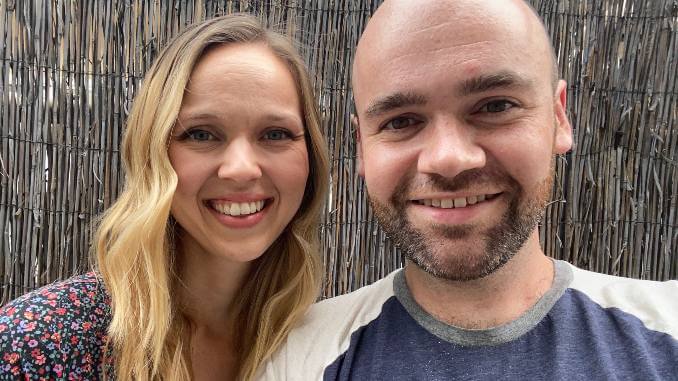Meet the Couple Behind Ellen Needs Insurance, the Meta Comedy Helping Actors Qualify for Health Insurance
Photo by Dru Johnston
It is a truth universally acknowledged that the US healthcare system is fucked up. Case in point: actor Ellen Haun is $804 shy of meeting her Screen Actors Guild minimum earnings in order to qualify for health insurance. SAG members must earn at least $26,470 during the year to remain on their health insurance plan.
Despite a frantic dash to audition as much as possible, Haun was worried she’d still not meet the minimum before the end of 2022, so she and her husband Dru Johnston decided to go meta and make a short film about her predicament. Haun (How to Get Away with Murder) and Johnston (The Chris Gethard Show) wrote the comedy Ellen Needs Insurance together and cast 15 actors in the same difficult situation as Haun, including some familiar faces like Doug Olear (FBI agent Terry Fitzhugh in The Wire), comedian Danny Jolles (Crazy Ex-Girlfriend, You Choose), and Liz Jenkins (Black-ish). They started crowdfunding for the project on Seed & Spark so they can pay Haun and her fellow cast members the necessary amounts for them to meet their minimums. As of this writing, they have about three days to raise the just over $2,000 left of their $29,600 goal.
Filming starts this weekend, with Haun in the lead role, Johnston directing, and Darren Miller (Funny Or Die) and Savvas Yiannoulou (Evergreen) producing. Paste caught up with Haun and Johnston over email to see how they formulated such an unconventional and ingenious plan to both qualify for insurance and showcase their talents as artists.
![]()
Paste Magazine: How did you two first meet?
Ellen Haun: We met at our friends’ wedding! We had a number of mutual friends but had never met. The bride had been listing off who the single men at the wedding were, but forgot to mention Dru, so I kept wondering why he was flirting with me.
Dru Johnston: I had a lot of college friends there, so Ellen got to see who I really was immediately. It’s hard to pretend to be cool when a group of your old classmates drag you out to the dance floor whenever Counting Crows comes on. So there was nowhere to go but up!
Paste: When did you first come up with the idea for a film to fulfill health insurance needs?
Johnston: Five years ago, unfortunately, when I was in almost this exact situation as a television writer. A lot of the entertainment unions function this way, where they tie your insurance eligibility to yearly earnings, and I was about $800 short of qualifying for WGA insurance, which as a human seems so close, but as a writer seems impossibly far. Because writing jobs in this industry feel like winning the lottery: you either get hired for a full season or you don’t get hired at all, so $800 might as well be $40K. I wrote a screenplay, some pilots, and numerous packets for late night comedy shows, just trying to land my next job, and I prayed for a last minute residual check. It didn’t happen. I thought up the idea for a short film called Dru Needs Insurance with only a month left, which wasn’t enough time to get funding together (you aren’t allowed to pay yourself), or production ready… and I was too late. I lost my insurance, and figured that idea was dead. But when we realized Ellen was in the same situation this year we resurrected it. Unfortunately the idea is evergreen in a dystopian sort of way.
Haun: When I realized something similar might be happening to me this fall, Dru and I started talking about the logistics of actually making a movie. That’s when our executive producer, Darren Miller at Big Mischief, came on board and got the ball rolling on making this project. From there we started our crowdfunding campaign and assembled a production team. After writing the script of course.
Paste: What’s it like writing together as a couple? Do you find your process is different than with other writing partners?
-

-

-

-

-

-

-

-

-

-

-

-

-

-

-

-

-

-

-

-

-

-

-

-

-

-

-

-

-

-

-

-

-

-

-

-

-

-

-

-








































